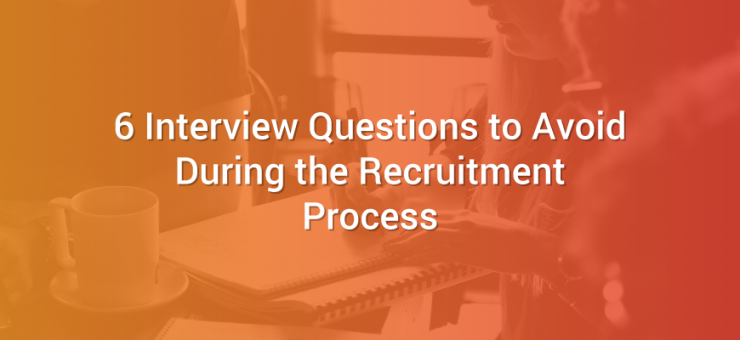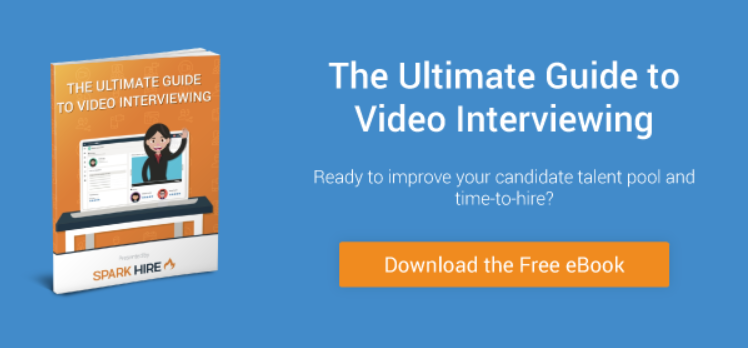One misstep in the recruitment process can send top talent running. Especially when candidates have the upper-hand on the market, the last thing you want to do is turn off a top contender for you open role with an ill-phrased or timed interview question.
While you can’t always control every aspect of the candidate experience, you can control your communication with candidates. We asked recruiting experts what to avoid asking in your next job interview. Here’s what they had to say:
1. “What’s your biggest career regret?”
 While popular, I believe ‘failure’ questions are a waste of time and can sour the mood of an interview. They trip up even great candidates and rarely reveal anything valuable about their work history and skills. Instead, ask specific questions about the challenges the candidate has overcome and the skills they want to improve. These questions often bear more helpful responses, without the risk of derailing an otherwise great interview.
While popular, I believe ‘failure’ questions are a waste of time and can sour the mood of an interview. They trip up even great candidates and rarely reveal anything valuable about their work history and skills. Instead, ask specific questions about the challenges the candidate has overcome and the skills they want to improve. These questions often bear more helpful responses, without the risk of derailing an otherwise great interview.
Lauren McAdams, career advisor and hiring manager at ResumeCompanion.com
2. “Where do you see yourself in five years?”
This is a classic interview question, but one that can land you in trouble as it can be seen as discriminatory. Female applicants may feel the question is unfair, particularly if they are planning to have children in this period. It’s much better to ask candidates what their ultimate career aspirations are, rather than tie this down to a specific time frame. Candidates will see this as showing a genuine interest in their ambitions rather than questioning their commitment.
Sue Andrews, HR & business consultant at KIS Finance
3. “What are your hobbies?”
Many interviewers will see this as an acceptable way to get a better understanding of a candidate. The danger is that some applicants may view this as an unnecessary intrusion, which has no bearing on their ability to do the job. Others may worry that candidates who find they have interests in common with the interviewer will be at an unfair advantage. Either way, avoiding asking these types of irrelevant questions will help you sidestep these types of pitfalls.
Sue Andrews, HR & business consultant at KIS Finance
4. “What type of dinosaur would you be?”
 Asking ‘quirky’ and unexpected questions is a quick way to put off many a good candidate. Of course, a little bit of humor in an interview can be a good thing as you want candidates to relax. But keep it appropriate and remember that applicants want to know whether they get the job is dependent on their skills and abilities rather than based on some unwritten set of rules.
Asking ‘quirky’ and unexpected questions is a quick way to put off many a good candidate. Of course, a little bit of humor in an interview can be a good thing as you want candidates to relax. But keep it appropriate and remember that applicants want to know whether they get the job is dependent on their skills and abilities rather than based on some unwritten set of rules.
Sue Andrews, HR & business consultant at KIS Finance
5. “Can you share more about the gap in your resume history?”
Twenty years ago, a gap on a resume would have been a red flag. Today, with the rise of remote work, gap years, and working abroad in non-traditional jobs, a gap in a resume could be part of your candidate’s greatest strength. Asking a candidate to explain themselves sets them up to frame their experience in a negative light. When in reality, they may have had great and relevant learning experiences during this time which would add value to your organization.
Tasia Duske, CEO at The Great Guac Off
6. “How soon can you start?”
 While it may seem like an exciting and positive question to ask, it skips the option to first do a trial run or paid test project. These in-between work arrangements are one of the best ways the interviewee and candidate can both assess whether this is a match.
While it may seem like an exciting and positive question to ask, it skips the option to first do a trial run or paid test project. These in-between work arrangements are one of the best ways the interviewee and candidate can both assess whether this is a match.
There is a saying, “hire slow, fire fast”, and at least for the hiring portion this rings true; it’s better to spend additional hours or days recruiting to make sure you hire the best people for your organization. Not rushing the interview with these types of questions will save you thousands of hours of productivity and effort down the road — not to mention candidates’ time.
Tasia Duske, CEO at The Great Guac Off












